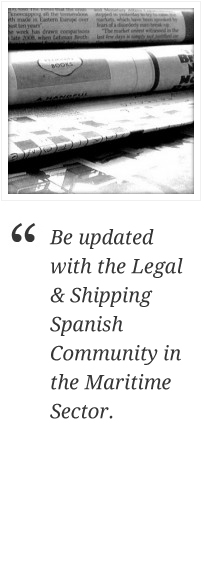August: CIRCULAR 4A/2003
STRICTER PORT INSPECTIONS OF 30% OF VESSELS CALLING TO SPANISH PORTS BY THE SPANISH AUTHORITIES, WHICH CAN BE EASILY FOLLOWED BY VESSEL’S DETENTION
Increased inspections in Spain reflect the growing concern of the Spanish government with regard to stricter port controls in an attempt to reinforce shipping safety, specially following the disaster of the mv “PRESTIGE†in November 2002. In fact, Spain is one of the EU States reporting a higher number of vessels’ detentions following port State inspections.
In February 2003 the Spanish government published a new regulation, Royal Decree 91/2003, to tighten the controls on considerable old vessels calling at Spanish ports and ensure that ships comply with international standards avoiding double inspections and providing more transparency. This regulation incorporates EU Directive 2001/106/CE and modifies the previous Spanish regulation, Royal Decree 768/1999, which incorporated EU Directive 98/25/CE, and Royal Decree 1828/2000, which incorporated EU Directive 99/97/CE (see our Circular 9A/2002).
Royal Decree 91/2003 has been strictly applied since its publication, resulting in sub-standard vessels being easily detained following PSC inspection until the deficiencies are rectified and Sanctioning Proceedings being sometimes started against owners. It is important to note that the Spanish Government is becoming increasingly concerned about the work and health conditions of the crew on board vessels calling at Spanish Ports, as well as those deficiencies which affect maritime security. There are also some Class Societies targeted.
According to the Spanish Government, 838 vessels were inspected from 13 November 2002 to 31 May 2003 and 31 Sanctioning Proceedings have been started. The Port Harbour which has undergone more inspections is that of Algeciras (83 inspections), followed by that of Valencia (76), Santander (71), Sevilla (67), Bilbao (63) and Castellón (44). Vigo and Villagarcia are the ones to have started more number of Sanctioning Proceedings (5), followed by Algeciras, Barcelona, Ceuta and Gijón (3) and then follows Castellón (2).
This new legislation basically stipulates the following:
- The inspection of a minimum of 30% of vessels calling to a Spanish Port. This 30% despite the EU Directive prescribes a minimum of 25%.
- The minimum inspection will be based on checking all the vessel’s required certificates and documents that she should have on board according to the International Conventions standards and on examining the general conditions of the vessel, particularly the engine room, accommodation and hygiene.
- The period of time to undertake the extended inspection to certain vessels (carrying oil products, bulk and passenger vessels) is reduced from one year to six months. These inspections contemplate the control of certain important elements for security, such as corrosion, fire extinguishing equipments, etc.
- When the deficiencies found are manifestly dangerous for maritime security, the Harbour Master will detain (“inmobilizaciónâ€) the vessel following the procedure contemplated in this legislation. The criteria to immobilise a vessel is contained in annex VI of this Royal Decree and the detention will take place basically when the vessel contravenes the following Conventions: SOLAS, STCW, IBC, IGC, MARPOL, OIT. Although sometimes, from experience, we can say that even though the deficiency found is not manifestly dangerous, the vessel is notwithstanding object of an unjustified detention. Owners can be then entitled to compensation for undue immobilisations or delays.
- Certain vessels (bulk carrriers, tank vessels, passenger vessels, ..) will not be authorised to enter a Spanish port, which are: (a) Those belonging to the black list and having been detained more than twice during the previous two years; and (b) Those under a flag described as high risk and have been detained more than once during the three previous years.
This new legislation establishes that the non-compliance with the requirements of the inspection can be easily typified as an administrative infraction contemplated in our 27/92 Ports Law, of which Chapter III, Title IV regulates Sanctioning Proceedings, Infractions and Fines. The sanctions are typified as small (fines up to Euro 60,101), severe (fines up to Euro 120,202 or 300,506 depending on the infraction) and very severe (fines up to Euro 901,518). Unluckily there is however no uniform criteria amongst the different Spanish Port Harbours regarding the amount of the sanction depending on the type of infraction. It is also often the case that if owners voluntarily recognise their responsibility in the deficiency found following PSC, then the amount of the sanction can be considerably reduced, as long as the deficiency is typified as an infraction by our domestic law.
Following PSC inspections the vessel can be therefore object of two detentions: (i) Immobilised by the Harbour Master in the PSC Inspection Procedure, which immobilisation will be lifted once the deficiencies have been repaired; and, (ii) Detained by the Harbour Master as a precautionary measure in a sanctioning proceeding against owners to guarantee the payment of the possible sanction, where a guarantee will have to be provided to release the vessel.
The only way to release the vessel if a sanctioning proceeding is to be started by HM is therefore by providing a guarantee. The only guarantees acceptable are cash money, cheques, bank guarantees and treasury bonds (which will need a specific wording to be accepted). Club letters are not accepted. It is important to note that there is a Circular of the General Directorate of the Merchant Marine advising all Spanish Harbour Masters that the minimum guarantee to be requested in sanctioning proceedings following MOU Inspections is of Euro 30,000.
There are however certain situations where the vessel will be detained prior to the sanctioning proceeding being started. This decision to immobilise the vessel before starting the sanctioning procedure can be appealed before the General Directorate of the Merchant Marine if a Sanctioning Proceeding is not started within 22 days after the arrest or if the arrest does not follow an infringement regarding pollution incidences.
Should any shipowners or operators have any queries or problems related to vessel detentions or immobilisations at any Spanish Port, they should not hesitate to contact us.

